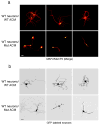Non-cell autonomous influence of MeCP2-deficient glia on neuronal dendritic morphology
- PMID: 19234456
- PMCID: PMC3134296
- DOI: 10.1038/nn.2275
Non-cell autonomous influence of MeCP2-deficient glia on neuronal dendritic morphology
Abstract
The neurodevelopmental disorder Rett syndrome (RTT) is caused by sporadic mutations in the transcriptional factor methyl-CpG-binding protein 2 (MeCP2). Although it is thought that the primary cause of RTT is cell autonomous, resulting from a lack of functional MeCP2 in neurons, whether non-cell autonomous factors contribute to the disease is unknown. We found that the loss of MeCP2 occurs not only in neurons but also in glial cells of RTT brains. Using an in vitro co-culture system, we found that mutant astrocytes from a RTT mouse model, and their conditioned medium, failed to support normal dendritic morphology of either wild-type or mutant hippocampal neurons. Our studies suggest that astrocytes in the RTT brain carrying MeCP2 mutations have a non-cell autonomous effect on neuronal properties, probably as a result of aberrant secretion of soluble factor(s).
Figures





References
-
- Amir RE, et al. Rett syndrome is caused by mutations in X-linked MECP2, encoding methyl-CpG-binding protein 2. Nat Genet. 1999;23:185–8. - PubMed
-
- Chahrour M, Zoghbi HY. The story of Rett syndrome: from clinic to neurobiology. Neuron. 2007;56:422–37. - PubMed
-
- Chandler SP, Guschin D, Landsberger N, Wolffe AP. The methyl-CpG binding transcriptional repressor MeCP2 stably associates with nucleosomal DNA. Biochemistry. 1999;38:7008–18. - PubMed
-
- Kriaucionis S, Bird A. DNA methylation and Rett syndrome. Hum Mol Genet. 2003;12(Spec No 2):R221–7. - PubMed
-
- Harikrishnan KN, et al. Brahma links the SWI/SNF chromatin-remodeling complex with MeCP2-dependent transcriptional silencing. Nat Genet. 2005;37:254–64. - PubMed
Publication types
MeSH terms
Substances
Grants and funding
LinkOut - more resources
Full Text Sources
Other Literature Sources
Molecular Biology Databases

